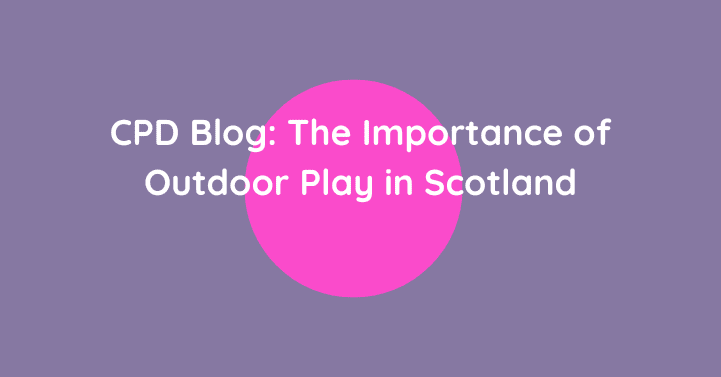The Importance of Outdoor Play in Scotland
A Research-Informed Guide for Practitioners
Aligned with the Scottish Curriculum and National Guidance
1. Why Outdoor Play Matters in Scotland
Outdoor play is firmly embedded in Scottish education policy. Scotland is internationally recognised for championing outdoor learning as a core entitlement for children from early years through secondary school.
Key national documents emphasising this include:
-
Curriculum for Excellence (CfE) – Outdoor learning enriches all curriculum areas.
-
Realising the Ambition: Being Me (2020) – Outdoor play is essential for early learning and development.
-
GIRFEC – Outdoor experiences help children become safe, healthy, achieving, nurtured, active, respected, responsible and included.
-
Learning for Sustainability (LfS) – Outdoor learning contributes directly to sustainability, wellbeing and global citizenship.
Scottish education is built on the belief that the outdoors is a powerful place for learning, not an add-on.
2. Research That Supports Outdoor Play
1. Cognitive & Academic Benefits
Outdoor play improves problem-solving, memory, language and concentration.
Evidence:
-
Rickinson et al. (2004) – outdoor learning enhances long-term retention.
-
Fjørtoft (2001) – natural environments support motor and cognitive development.
2. Physical Health & Motor Skills
Natural landscapes offer varied movement opportunities essential for healthy development.
Evidence:
-
Brussoni et al. (2015) – outdoor play supports physical resilience and active habits.
-
Tandon et al. (2018) – children are significantly more active outdoors than indoors.
3. Emotional Wellbeing
Nature reduces stress, supports emotional regulation and boosts wellbeing.
Evidence:
-
Wells & Evans (2003) – natural environments buffer the effects of stress.
-
Kelz, Evans & Röderer (2013) – even short outdoor experiences improve mood and calm.
4. Social Development & Confidence
Outdoor spaces support risk negotiation, independence, teamwork and confidence.
Evidence:
-
Sandseter & Sando (2016) – outdoor play supports resilience and risk assessment skills.
3. How Outdoor Play Aligns With Scottish National Guidance
Curriculum for Excellence (CfE)
Outdoor learning contributes to:
-
Health & Wellbeing
-
Literacy & English
-
Numeracy & Maths
-
Sciences
-
Social Studies
-
Expressive Arts
-
Technologies
Learning outdoors supports breadth, depth and challenge in interdisciplinary learning.
Realising the Ambition (2020)
Outdoor play is viewed as:
-
A fundamental right
-
Essential for early years pedagogy
-
A way to support curiosity, creativity and confidence
-
A natural environment for young learners to thrive
GIRFEC
Outdoor experiences help deliver the SHANARRI wellbeing indicators:
-
Safe – practicing safe risk-taking
-
Healthy – physical activity and fresh air
-
Achieving – hands-on learning and inquiry
-
Nurtured – emotional calmness outdoors
-
Active – movement and exploration
-
Respected – child-led learning outdoors
-
Responsible – caring for nature
-
Included – all spaces adaptable for SEND
4. Outdoor Play and Inclusion in Scotland
Scotland places great emphasis on reducing barriers and providing equitable access.
Outdoor learning benefits:
-
SEND learners (sensory, ASD, ADHD, SEMH)
-
EAL learners
-
Children with trauma/ACEs
-
Children lacking confidence indoors
-
Children who learn better through movement
Evidence:
-
Änggård (2011) – nature supports neurodiverse learners.
-
Barrable (2019) – outdoor learning supports emotional regulation and inclusion.
Outdoors offers:
-
Calmer environments
-
Predictable routines
-
Sensory regulation
-
Space for movement
-
Hands-on, meaningful learning
-
Low-pressure communication opportunities
5. Example Outdoor Play Opportunities in Scottish Settings
Early Level
-
Exploring puddles and weather
-
Using sticks for mark-making or counting
-
Mini-beast hunts
-
Outdoor storytelling
-
Mud kitchens and potion play
First & Second Level
-
Science investigations (forces, habitats, materials)
-
Maths trails
-
Outdoor literacy: story mapping, descriptive language walks
-
Outdoor art using clay and natural textures
-
Social studies: mapping the school grounds
6. Using The Muddy Puddle Teacher® Toolkit in Scottish Settings
The toolkit aligns strongly with Scotland’s outdoor pedagogy, supporting sustainability, inclusion and experiential learning.
Toolkit Methods
1. Bamboo Method
For measuring, shape-making, boundaries and structure.
2. Rope Method
For science investigations, team tasks, movement-based maths, and clear space boundaries.
3. Clay Method
For expressive arts, sensory regulation and modelling in science or literacy.
4. Stick & Stone Method
For sorting, counting, loose parts STEM, literacy and pattern-making.
5. Puddle Play Method
For weather investigations, descriptive language and scientific inquiry.
6. Loose Parts & Upcycled Method
For problem-solving, engineering tasks and creative open-ended learning.
The Toolkit supports CfE’s emphasis on active, creative, sustainable and learner-led experiences.
7. Reflection Questions for Scottish Practitioners
-
How does our current curriculum planning use outdoor environments?
-
Which children benefit most from outdoor experiences?
-
How can we link outdoor learning to CfE outcomes more consistently?
-
Which Muddy Puddle Teacher® method could we implement this term?
-
How can outdoor learning support SHANARRI wellbeing indicators?
-
How do we ensure equitable access for children with SEND?
8. Next Steps for Scottish Schools & Early Years Settings
Strengthen your outdoor learning culture with:
-
The Muddy Puddle Teacher® Level 1–4 Programme
-
Specialist SEND outdoor courses
-
Curriculum modules for Maths, Science, English and Wellbeing
-
Free demonstrations on our social media pages
-
Staff training and site-based development
For CPD bookings or consultancy:
info@themuddypuddleteacher.co.uk


